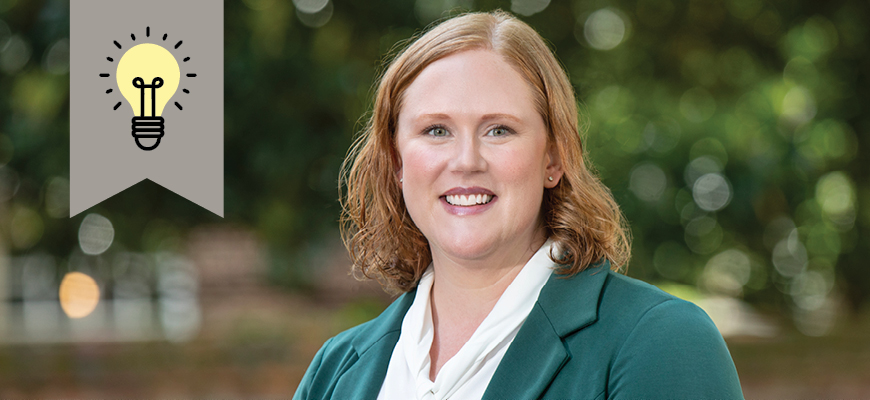
Garnet Apple award: Patricia Fabel
Posted on: August 5, 2021; Updated on: August 5, 2021
By Craig Brandhorst, craigb1@mailbox.sc.edu , 803-777-3681
Patricia Fabel
Associate Professor, pharmacy
Executive Director, Kennedy Pharmacy Innovation Center
Pharm.D., University of Rhode Island, 2006
2021 Garnet Apple Teaching Award
Joined UofSC faculty: 2001
I was drawn to community pharmacy because you get to educate patients. You don’t only provide medication, but you help patients use that medication. They’re not students, but you help them understand their disease state and how to take care of themselves. There was always an aspect of wanting to teach, but it didn't necessarily have to be in the classroom.
It probably started in eighth grade. That's the first teacher I can think of that really challenged me, our math teacher. The teachers that I look up to the most and consider mentors have been the ones that challenge their students, that stretch you a little bit farther than you probably think you can go.
I’m an introvert. As a student, I didn’t like to speak up in class. I appreciated those teachers who would ask questions but not necessarily require a verbal response. I try to get the students to process material and think about the material but in ways where they don’t necessarily have to raise their hand and speak in front of the class if they don’t want to. That’s where team-based learning comes in.
Team-based learning is where they gather information or learn new information on their own — in my case, through assigned readings — then they come to class and work in permanent teams, the same teams throughout the entire semester.
I get to see my students’ thinking. I get to see their thought processes through their responses and discussion questions. And then I can see maybe where they're struggling, too. Maybe they're close, but not quite grasping something. Or sometimes they connect the dots to something that I wasn't even thinking about myself. Because of the method, it comes up in class.
If I have 110 students, they're bringing 110 different perspectives on the material. Whether we're talking about immunizations, medications, over the counter products or things that they've interacted with and their family has interacted with, they bring different perspectives to the table. That’s another reason why I like the team-based learning model. They bring up things. They challenge me as a teacher, as a pharmacist. That mentality that I'm here to learn from them as well has helped me not take myself too seriously as a teacher and not get caught up in my own ego.
I always appreciated those professors you respected but who would, in a sense, treat you as a colleague, who would talk about things that they found helpful in their career and wanted to pass on to me as a student. It wasn't necessarily something for a test. They were just saying, “Hey, I found this really helpful, and I want to offer it to you.”
No one is finished. There's always room for improvement, and to play even just a small part in that growth and improvement, particularly in a professional capacity, has been really rewarding — to be able to see students come in as these young first-year pharmacy students at their white coat ceremony, then see them graduate, then go on to become pharmacists. It's just really rewarding to have sort of a front row seat.